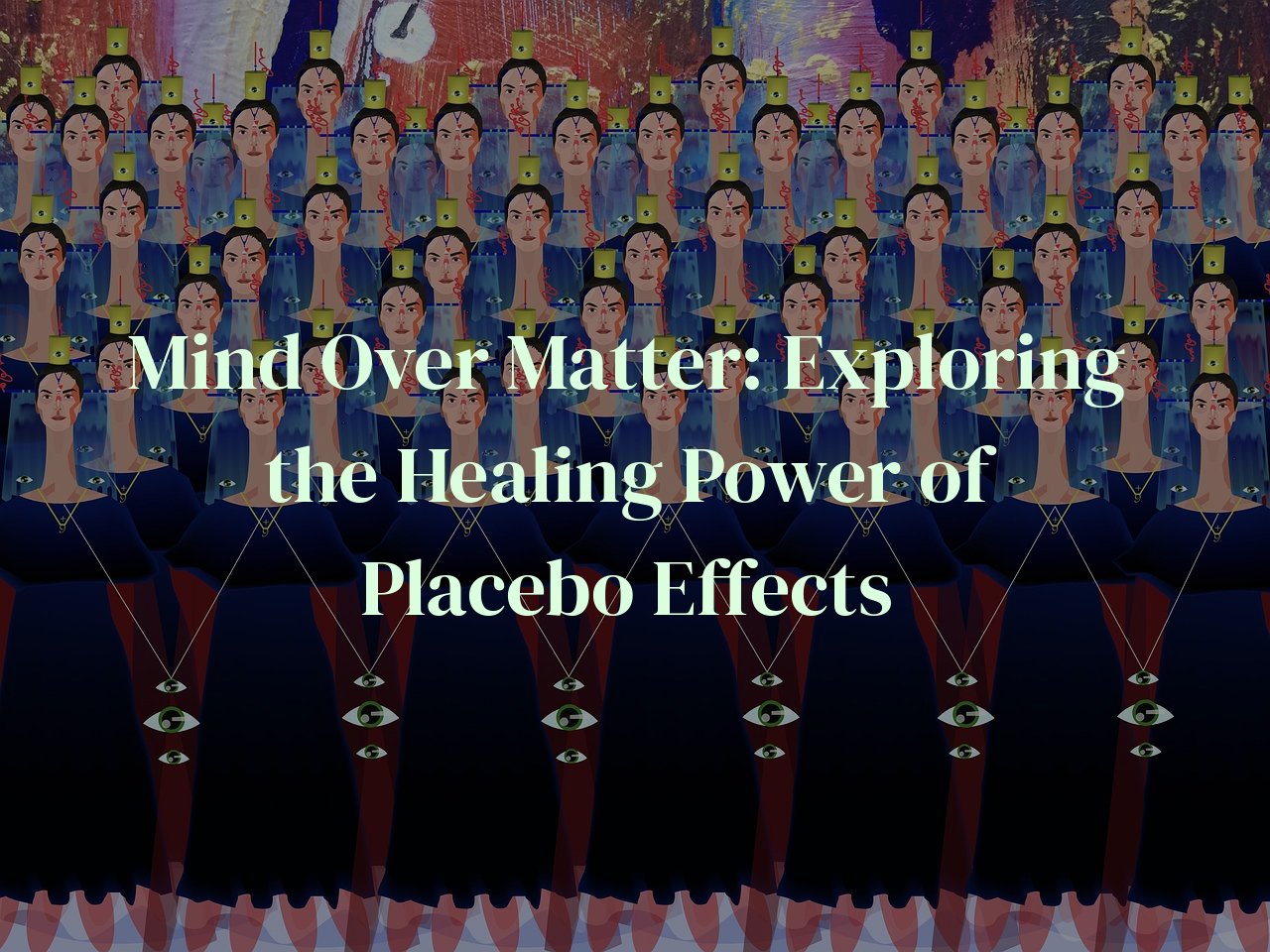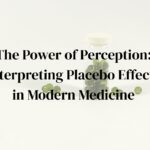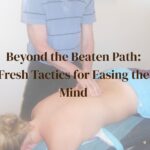
Embark on a transformative journey through the intricate pathways of our minds with ‘Mind Over Matter: Exploring the Healing Power of Placebo Effects’. In this explorative post, we’ll delve into the enigmatic corners of the psyche, unveiling how our expectations, beliefs, and the context surrounding medical treatments can dramatically influence our physical health. Discover how a belief in treatment, even when it’s a placebo, can sometimes lead to real, tangible healing. By understanding the psychological mechanisms at play, readers can gain insights into the potent link between thoughts and bodily well-being, potentially unlocking new approaches to healing that harness the power of the mind. This post promises to not only inform but also inspire and empower readers to look at health through a psychological lens, introducing tangible benefits for anyone intrigued by the intersection of mental prowess and physiological recovery.
Table of Contents
Demystifying the Placebo Effect: Psychology Meets Physiology
The placebo effect is a fascinating phenomenon that straddles the lines between the psychological and the physical realms. Here, the belief in or expectation of healing can trigger actual biological changes. It’s a symphony of mind and matter, dancing to the tune of therapeutic intention.
One might ask, how is it that a simple sugar pill or saline injection, with no active treatment properties, can lead to improved health outcomes? The answer lies in the neural crossroads of perception and physiology. When an individual believes they are receiving an effective treatment, their brain becomes a catalyst, orchestrating a release of endogenous substances – endorphins and neurotransmitters which mimic the effects of true medication.
The mind’s powerful influence extends further, affecting various physiological systems such as the immune and autonomic nervous systems, altering pain perception, and even impacting hormonal levels. Notably, imaging studies have illuminated how placebo treatments can activate specific brain regions implicated in pain control and mood regulation, analogous to the way actual pharmaceuticals might work.
At its core, the placebo effect challenges the traditional dichotomy between psyche and soma, revealing a complex interplay where expectation fuels biological responses, and in turn, physical health can reinforce mental well-being. This intricate relationship underscores the importance of psychological factors in the healing process and shapes our understanding of human health in its entirety.
Crucially the placebo effect illuminates the underlying potential of harnessing the power of the mind as an adjunct to traditional medical therapies. While the mystery of the placebo effect is not fully unraveled, each thread we pull in this web of mind-body connections leads us to a more integrative approach to health and healing.
The Mind’s Influence on Physical Well-being: Belief as a Catalyst for Healing
The intersection of mental fortitude and physiological well-being has long intrigued both scientists and healthcare practitioners. Historically regarded as a medical curiosity, the intricate dynamics of the placebo effect spotlight the compelling influence of an individual’s beliefs and expectations on their physical health. Sensing and believing in the promise of relief or cure can indeed act as a powerful catalyst for healing. This phenomenon is not a mere trick of the mind, but rather a tangible intersection where psychology meets physiology, shaping biological responses.
At its core, the ‘belief-effect’ taps into the body’s natural pharmacy – the complex neurobiological pathways that can alter pain perception, modulate immune responses, and even impact the cardiovascular system. When a perceived intervention aligns with an optimistic outlook, cognitive processes can trigger the release of endorphins, the body’s natural pain relievers, akin to pharmacological analgesics. Moreover, the power of belief can modify stress responses, lowering cortisol levels and thereby influencing a wide range of bodily functions that are implicated in healing.
However, it transcends even these bio-chemical exchanges. The self-fulfilling prophecy embedded within optimism has been observed to enhance treatment adherence, leading to better health outcomes through increased engagement with positive health behaviors. Thus, when belief morphs into tangible action, a virtuous cycle is created, favorably tipping the scales towards recovery and well-being.
Embracing belief as a pivotal element of healing does not negate the necessity and efficacy of traditional medical intervention; rather, it presents an adjuvant tool that could synergize with clinically established therapies. Recognizing the potent force that belief wields over the body’s healing processes opens up a constellation of therapeutic possibilities, particularly in chronic conditions where mind-body interactions are unmistakable and where medicine currently acknowledges a need for more holistic approaches.
As we peel back the layers of the placebo effect, we gain a deeper understanding of the biopsychosocial model of health, whereby healing is a confluence of biological, psychological, and social elements. The mind’s influence on physical well-being is an ode to the intricate tapestry of human health, underscoring that belief, backed by a body that listens and responds, can indeed serve as a formidable ally in the journey towards health and restoration.
Contextual Healing: How Environmental and Social Factors Bolster the Placebo Effect
The power of context in the realm of healing is a fascinating component of the placebo effect. It is not merely the substance or treatment that instigates a patient’s improvement, but also the surrounding environmental and social elements that play a significant role. This phenomenon is deeply rooted in the psychological interplay between an individual’s expectations and their sensory experiences. The ambiance of a treatment room, the perceived competence and care of medical staff, and the rituals associated with receiving treatment all contribute to the effective ‘theater’ of medicine that can trigger a healing response.
Environmental factors such as lighting, colors, and sounds within a healthcare setting have been shown to influence patients’ perception of their treatment, potentially heightening the placebo effect. A tranquil environment with soft lighting and soothing colors might promote relaxation and a sense of safety, thus enhancing the patient’s belief in the efficacy of their treatment, even if it is a placebo.
Social factors are equally potent. The confidence and warmth displayed by healthcare providers can significantly influence placebo responsiveness. The interaction with a compassionate provider who offers attentive care can instill a strong belief in a treatment’s effectiveness. Furthermore, witnessing the recovery of other patients in a communal setting can create a narrative of expectation and hope, further reinforcing the placebo effect. This shared belief within patient communities acts as a catalyst for individual and collective healing journeys.
Cultural influences also mold the placebo response, as medical practices and healing methods vary widely across different societies. What might be deemed a powerful healing agent in one culture could be seen as inert in another. This variation underscores the role of cultural beliefs and expectations in shaping the psychological impact of the placebo effect.
All these components—environmental cues, social interaction, and cultural context—are threads in the intricate tapestry of contextual healing. They interweave to form a backdrop that supports and enhances the psychological underpinnings of the placebo response. By harnessing these factors, medical practitioners can create a therapeutic milieu that maximizes healing potential, leveraging the mind’s ability to influence the body’s health.
Placebos in Medical Practice: Ethical Considerations and Patient Outcomes
When it comes to the intersection of placebos and clinical care, the landscape is fraught with ethical conundrums and questions that delve into the very nature of healing. In medical practice, the use of placebos must be navigated with utmost integrity, balancing the potential for harm against the undeniable outcomes that suggest a profound effect on patient wellness. One must consider the principles of beneficence and non-maleficence, pillars of ethical medical practice that advocate for the well-being of patients while avoiding any infliction of harm.
Moreover, the doctor-patient relationship hinges on trust and transparency. Administering placebos without consent undermines this trust, potentially damaging the therapeutic alliance. However, transparently utilizing placebos, known as ‘open-label placebos’, has emerged as an intriguing field, where patients are aware they’re receiving a placebo yet still exhibit notable health improvements. This straightforward approach respects patient autonomy and informs consent, ensuring a partnership grounded in honesty.
Another facet to consider is the implications for healthcare costs and resource allocation. The utilization of placebos could, in theory, lead to a reduction in the use of more expensive and potentially invasive interventions without compromising patient outcomes. This suggests a tantalizing avenue for reducing healthcare expenditure, albeit one that necessitates careful scrutiny to prevent abuse and ensure equitable access to necessary treatments.
Furthermore, as we acknowledge the diverse responses to placebos, we see a vivid embodiment of individual variability in treatment outcomes. Some patients may experience significant benefits from placebo interventions, which poses questions about personalizing medical treatments and the value of subjective healing experiences alongside evidence-based practices.
Ultimately, placebos in medical practice continue to provoke discussion and debate, serving both as a mirror reflecting our complex relationship with healing and as a beacon guiding us towards a deeper understanding of how psychology intertwines with physiology. As medicine advances, ethically integrating placebos into patient care presents an opportunity to harness the full spectrum of healing, fundamentally rooted in the power of belief and the mind’s influence over the body.
Beyond Placebos: The Future of Psychologically-Induced Healing Techniques
The exploration into the realm of psychologically-induced healing techniques unfolds exciting prospects beyond traditional placebos. As we edge forward, the integration of cutting-edge technologies, along with an enhanced understanding of psychological processes, prepares us to redraw the boundaries of healing. One such advancement includes biofeedback mechanisms, where individuals learn to control physiological functions once believed to be involuntary, like heart rate and muscle tension. This self-regulation process, underpinned by real-time data, empowers subjects to forge a deeper connection between mind and body for therapeutic purposes.
Another frontier is the advancement in virtual reality (VR) healing environments. Pioneering studies suggest that immersive VR experiences can modify pain perception and anxiety, potentially crafting personalized healing scenarios. The sensory-rich stimuli these virtual worlds offer, operate on the mind’s power to elicit physiological responses, aligning patient’s psychology with the healing process. These ‘digital placebos’ might soon become a staple in pain management and rehabilitation therapies.
Furthermore, the burgeoning field of psychoneuroimmunology (PNI) delves into how psychological factors can influence the immune system. Future interventions may involve cognitive-behavioral training to bolster immune response in patients, leaning on the tangible link between the mind’s outlook and the body’s innate defense mechanisms. Psychological resilience training can fortify one’s emotional and physical well-being, potentially reducing the susceptibility to illness.
Coupled with the continuous development of mindfulness and meditation practices, which have shown to effect significant changes in brain activity and biochemistry, a holistic tide is set to surge in the medical landscape. The synergy of these techniques predicates a healthcare revolution, where the duality of mind and body is not merely acknowledged, but actively engaged in search of healing and wellness.
Conclusion
In conclusion, our foray into the psychological theater of placebos has revealed a fascinating intersection of mind and body, shedding light on our remarkable ability to influence our own health outcomes through belief and expectation. As we embrace the complexities of the placebo effect, we find that the adage ‘mind over matter’ may, in fact, hold a kernel of physiological truth that could inform future health interventions and patient care. The mind’s power to cure remains a beacon for those seeking holistic and integrative approaches to wellness, guiding us towards a more comprehensive understanding of healing where every thought could be just as crucial as any medication.



